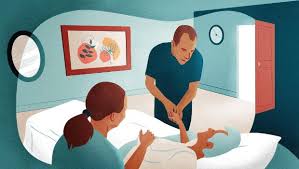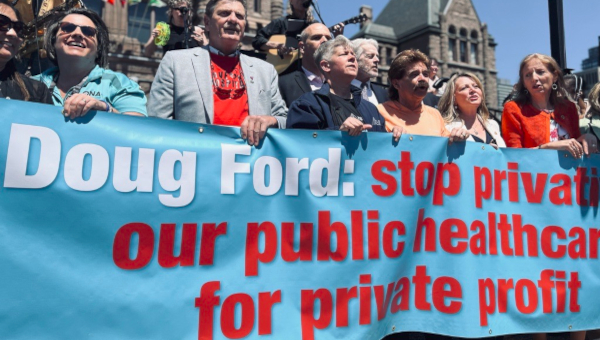Assisting Death Without Supporting Life
The BC Civil Liberties Association (BCCLA) has taken a position with regard to Canada’s system of Medical Assistance in Dying (MAID) that is of great importance for those who approach this complex issue from any broadly progressive position. A December 19 article in the National Post notes that the BCCLA is raising very serious concerns about how MAID is being implemented despite the fact that it is the body that brought forward the constitutional challenge that led to “the 2015 decriminalization of physician-assisted suicide in Canada.”
Liz Hughes, the BCCLA executive director, says her organization is “aware of concerning reports of people being offered MAID in circumstances that may not legally qualify, as well as people accessing MAID as a result of intolerable social circumstances.” Last year, Hughes indicated that the BCCLA “may very well (adopt) either a modified or a new policy around our position on MAID in light of the fact of, you know, that it’s being abused.”
Another BCCLA staff member indicated that “we’ve done an environmental scan, so that was a kind of review of what’s currently happening with MAID in Canada, and it’s very concerning … the whole coercive dynamic that’s inherent with, you know, disabled people and their healthcare providers.” BCCLA staff were particularly alarmed by “reports of MAID being used in prisons while incarcerated people were shackled to their beds, the program’s lack of legal oversight, disproportionate representation of impoverished people receiving assisted suicide, and healthcare practitioners offering assisted suicide when patients asked for support for living.”

Social Context
That such a position is being taken by the very body that played such a pivotal role in the introduction of MAID is of great significance. Moreover, it is important to stress that the BCCLA hasn’t reversed its support for assisted dying. Hughes states in the article that, while she is “very uncomfortable with our previous work around MAID,” her organization “stands by our work to make the right to choose MAID a reality in Canada” as it is important for “choice, agency, and bodily autonomy.”
As someone who has been involved in the debate around MAID, I have argued that the social context of austerity and social abandonment in which the program is operating is a decisive consideration. In an article in Canadian Dimension, I wrote that “(t)he proposition that assisted death has been introduced in a social context dominated by the systematic undermining of systems of social provision needs no supporting evidence. The lack of affordable housing, the inadequacy of social benefits, the weakening of public healthcare and a general decline in the standards of public services are all well established.”
I also pointed out that “the extension of MAID to those not facing a ‘reasonably foreseeable natural death’ has already produced situations where the choice of death would not have been made but for poverty and a lack of support. The danger is that this will intensify as MAID is expanded and normalized.” I cited concrete examples of just how this appalling trend is playing out.
The BCCLA’s position on the matter is encouraging and enormously helpful precisely because it is being taken by a highly knowledgeable body that has done a great deal to advance access to assisted dying in Canada. I must say that most of the responses I have received to what I have written from left advocates of MAID have been troubling. People have denied or downplayed the evidence of the terrible problems with how the program has been operating and stressed the abstract moral principle of the right to choose without seriously considering the societal reality in which it is being applied. My hope is that the BCCLA’s honest accounting will encourage others to rethink their uncritical approach to MAID. That means challenging the dreadful directions in which the program is being steered.
It is necessary to acknowledge that providing those in the last stages of their lives with a legitimate choice as to the circumstances of their deaths is a major part of how MAID is functioning. Health Canada’s fifth annual report on the program shows that, of the 15,343 people who received MAID in 2023, 95.1% were Track 1 (terminally ill) cases and that 64.1% of these were suffering from one of several specific forms of cancer. Moreover, 76.9% of Track 1 cases did have access to palliative care.
Under the kind of approach that the BCCLA is taking, with continued support for the principle of the right to choose assisted dying matched by a rejection of its use as a tool of social abandonment, these figures would be a very valid starting point. It would be necessary, first of all, to challenge the fact that almost a quarter of Track 1 cases didn’t have access to palliative care.
A 2023 article by Global News pointed to the ‘patchwork system of palliative care’ that exists in this country and showed how lack of access to it follows fault lines of social and racial inequality and reflects the under-servicing of rural areas. Assisted death is simply not a legitimate choice if available means of supporting life in its last stages are withheld in a political climate of austerity. Indeed, under such an agenda, assisted death can become an alternative to providing such support.
Despairing Conditions
It is, however, the extension of MAID to those who don’t face a ‘reasonably foreseeable natural death’ (Track 2 cases) that poses the greatest dangers. As the above mentioned Health Canada report notes, in order to be accepted for the process of assisted dying, a person must be found to have a ‘grievous and irremediable medical condition.’ Among other considerations, it must be determined that such a condition “causes the person enduring physical or psychological suffering that is intolerable to the person and cannot be relieved under conditions that the person considers acceptable.”
The great problem, of course, is that suffering that might well be relieved with a reasonable income, decent housing, or specific medical or social support may become intolerable when these things are lacking. Dignity With Dying has challenged this proposition by asserting that “(n)o one can receive MAID on the basis of inadequate housing, disability supports, or home care.” Yet, while this is formally correct, it is precisely conditions of poverty and social exclusion that can drive people to conclude that death is the only ‘solution’ this society offers them.

A report by CTV dealt with the case of “(a) 51-year-old Ontario woman with severe sensitivities to chemicals (who) chose medically-assisted death after her desperate search for affordable housing free of cigarette smoke and chemical cleaners failed.” As she struggled to find a solution, “(f)our Toronto doctors were aware of Sophia’s case and they also wrote to federal housing and disability government officials on her behalf. In that letter the doctors confirmed that her symptoms improved in cleaner air environments and asked for help to find or build a chemical-free residence.”
Eight days prior to her death, Sophia made a video in which she stated that “(t)he government sees me as expendable trash, a complainer, useless, and a pain in the a**.”
After Sophia’s life had been ended, Dr. Riina Bray, a Toronto physician who treats those with environmental sensitivities, commented that “(i)t was an easy fix. She just needed to be helped to find a suitable place to live, where there wasn’t smoke wafting in through the vents.”
The extension of MAID to people suffering solely from a mental health condition has been delayed until 2027, but if this measure is adopted, it will only increase the degree to which despairing conditions can drive people to seek assisted death. A former member of the Ontario Coalition Against Poverty (OCAP) recently applied for MAID but was turned down on the grounds that his mental health diagnosis didn’t yet constitute grounds for a successful application.
Decent income and adequate housing would make an enormous difference in this man’s life and very probably a decisive one. His life is worth a great deal, and the priority of any decent society would be to preserve and enrich it. To impose upon him conditions that rob him of hope, and having made a medical determination that disregards those very conditions, to offer him death as a supposed solution would be a clear-cut case of social murder, in my view.
No one can dismiss the notion that people should have very definite rights when it comes to choosing the circumstances of their deaths. The right to make decisions with regard to intolerable suffering or dignified death is not something that can be disregarded. At the same time, however, no one on the left can viably be part of an uncritical cheering section for the present system of assisted dying in Canada. The link between what is actually being implemented and the intensifying assault on the social infrastructure, with all the suffering this causes, is too clear to disregard. We must force the state to provide full and adequate supports, mental and physical, for the living as the necessary precondition for ethical and responsible choices in medically-assisted dying. •





